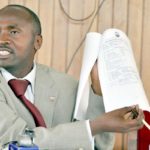The Uganda Debt Network (UDN) has urged the government to establish simpler registration procedures to formalise the informal sector, expand the country’s revenue base and reduce public debt.
According to UDN, a national civil society organization which tracks how government manages the public debt wants the government to balance between public investment especially infrastructure and macroeconomic stability in light of increased domestic borrowing on exchange rate and debt.
“Increase linkages between public infrastructural investment and rapid growth areas like Agriculture to expand productive capacity of Uganda’s economy,” UDN says, and adds that the Ministry of Finance has so far released sh4.1 trillion for debt repayment for the first half of the financial year.
To reduce debt accumulation, UDN wants government to scale down annual budget sizes for instance by slashing recurrent sector budgets, reversal of wasteful expenditure and rationalization of the run-away cost of public administration.
The NGO says that much as government is committed to paying debts, the country’s debt levels still remain high.
‘In March 2011, Uganda’s debt was US$4.29bn and it is expected to increase beyond US$ 13bn in FY 2017/18 hence raising debt costs,’ it says.
A report by Bank of Uganda in June, 2016, UDN says, showed that public debt stock stood at Shs46.1 trillion (US$13billion) by April 2016, which was about 52% of GDP, already beyond the 50% threshold and is pushing the country into another debt trap. UDN warns the level of sustainability notwithstanding is unhealthy for an economy aspiring to reach mid-income status by 2020 with a debt position that is more than half of its GDP.
UDN is one of the civil society organizations that have over the years called upon the government to have a more transparent approach to budget policies, public particularly have urged the Finance ministry to improve access to the details entailed in the national budget document.
The NGO has urged the public to pay more attention to the money that has been allocated to various entities and ensure its properly utilized. “The public should also demand for accountability since close to 70% of the National Budget is funded domestically and mainly by taxes that citizen’s pay,” it says.
Meanwhile, in an attempt to simplify the details of the national budget for ordinary Ugandans as way of promoting transparency and accountability, the finance ministry mid-October published a guide that the various stakeholders can use to follow the budget.
The guide, known as ‘Know Your Budget citizen’s guide to the 2017/18 budget’ was launched by Finance minister Matia Kasaija in Kampala.
The booklet spells out the country’s economic performance and outlook, revenue and tax measures, expenditures and interventions in key sectors like agriculture, energy and mineral development, works and transport, education, health, water and environment, social development, security and policy initiatives.
The citizens’ guide aims to enrich and enable government clients, civil society organisations, development partners and the general public to understand government plans by highlighting the strategic objectivities of the FY2017/18 Budget and provide understanding of new tax measures and reasons behind the resource allocations to key sectors.








